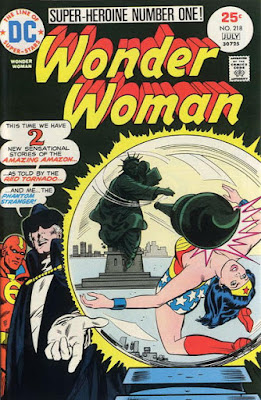Thoughts, reviews, rants, laments, and general chatting about the wonderful world(s) of comic books.
Jun 5, 2017
The 40 Years of Comics Project - Day 831: Wonder Woman #218, June-July 1975
I was about to get all angry about these trials that Wonder Woman is undergoing, but I thought before I flew off the handle, I should do a bit more research. It turns out Wonder Woman requests this surveillance and testing herself, after regaining her powers and finding out that her mother has erased some of her memories, the tale of which is told (or perhaps re-told) in Wonder Woman #270. So it's not the men being unfair to her, but her testing herself which, really, is more in line with her character now that I think about it.
That said, the missions have a very odd aesthetic for superhero comics published in the 70s. DC was becoming a far more integrated universe at this point, but the adventures Wonder Woman has in these last couple of comics smack more of the standalone stories of the early 60s. I could see the old Doom Patrol having to fight a Statue of Liberty that comes to life, or the original Teen Titans facing off against a strange alien robot that lands in the middle of the desert. Undoubtedly these were the kinds of adventures Wonder Woman had a decade or so before this comic was published, but they seem a bit out of place in the last days of the Silver Age, and before her retconned history following the Crisis.
One of the complaints that often dogs Wonder Woman's comics is that writers don't seem to know what to do with her. I get the suspicion that it's because the writers are, by and large, men who don't actually know what to do with a strong female lead. That might seem unfair, and I don't mean to level it as a criticism of the people involved in the creation of the stories, but rather at the society that has socialized them into not knowing what to do with a strong female character. I think, really, we're only just, in the last 10-15 years, seeing a generation of male writers who are coming to understand how to handle female protagonists. But in the Sixties and Seventies, though there are definite gestures toward treating female characters equitably, the larger education of mid-Twentieth century society produces a difficulty in creators trying to wrap their heads around a woman who doesn't need a man around. There were so few models to draw upon.
I don't want that to sound disparaging of a group of writers whose work I actually hold in high esteem. But one is always limited by the society within which one develops, so as much as one might want to push at the boundaries of that society, it can be hard without the proper tools.
To be continued.
Subscribe to:
Post Comments (Atom)

No comments:
Post a Comment